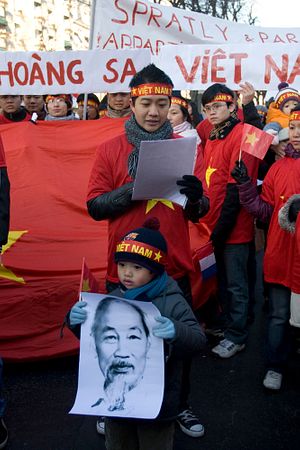The dispute between South Korea and China over the deployment of the Terminal High Altitude Area Defense (THAAD) system by the United States on South Korean soil has both political and economic ramifications. In particular, the retaliatory measures by the Chinese government against South Korea’s decision to deploy THAAD have been surprisingly damaging to the export-oriented economy of South Korea.
According to a recent report by a senior researcher from the Economic Research Institute of the Industrial Bank of Korea (IBK), this economic retaliation by China may cost South Korea from $7.69 billion up to $14.76 billion in the worst-case scenario. As China is the biggest importer of South Korean exports (more than a quarter of South Korea’s export revenues in 2015 came from China), the report concluded that the export sector of South Korea will likely be hit with the heaviest blow, with possible losses from the Chinese retaliation ranging from $4.14 to $8.27 billion (or from 5 percent to 10 percent of the total export value). Although suffering less in term of total loss, the tourism and entertainment sectors of South Korea will probably experience a much bigger percentage decrease (ranging from 10 percent to 30 percent) since they have been directly affected by Chinese government’s moves to partially ban the sales of Korean entertainment content and to discourage the promotion of South Korean tours to Chinese customers, who held more than 34 percent of all South Korean tourist visas granted in 2016.
The dire negative economic impact of Chinese retaliation for the THAAD deployment in South Korea has also been predicted by other international experts. Therefore, it came as no surprise that South Korea recently made an official complaint to the World Trade Organization about the economic measures used by China to strike against the THAAD deployment, which were regarded by the South Korean government as unfair and a violation of trade agreements.
There are lessons here for Vietnam, although not a direct parallel. The deployment of any U.S. missile defense system in Vietnam is improbable given the different security conditions of the Southeast Asian country, the lack of formal alliance between the two states, as well as the Vietnamese government’s principle of not allowing Vietnamese soil to be used by foreign forces. Nevertheless, the tension between Vietnam and China over the islands claimed by both sides in the South China Sea, which has been heightened in recent years, is a legitimate basis for Vietnam to worry about similar tactics that the Chinese government may use in case of unresolved conflicts. In fact, the territorial dispute over the Senkaku/Diaoyu Islands in the East China Sea was the rationale for Chinese economic retaliation against Japan in 2011 and 2012, which led to a significant drop in Japan’s exports to China and the number of Chinese tourists visiting Japan during this period.
Moreover, the similarity between the China-South Korea and China-Vietnam economic relationships gives the Vietnamese authorities plenty of reasons to anticipate comparable losses would be inflicted by Chinese economic retaliation. For example, exports to China accounted for 18.7 percent of Vietnam’s total exports in 2016 (around $32.96 billion). As a result, a similar economic drop to what’s expected for South Korea would cost the Vietnamese economy from $1.6 to $3.3 billion (around 0.77 to 1.56 percent of Vietnam’s 2016 GDP). Those most affected by such a decrease would be manufacturers of electrical devices, textile factories, and agricultural producers, who accounted for about one-third of the total export value from Vietnam to China in 2016. Since China is also a major supplier of raw materials to Vietnam, the manufacturing economy of the latter will equally suffer from any export restriction policy. A heavy dependence on Chinese partners has also been observed in the tourism sector of Vietnam, as more than a quarter of the 10 million tourists visiting this country in 2016 came from China. Using the IBK report’s estimate of a 20-30 percent drop in the number of Chinese visitors due to China’s restriction policy, the Vietnamese tourism sector should expect the loss of 500,000 to 780,000 customers from China in case of economic retaliation, or from 5 to 7.8 percent of the total number of visitors to Vietnam in 2016.
Note that this article does not discuss the economic consequences caused by China’s retaliation policy on the Chinese manufacturers themselves, although it can be assumed that such losses can be partly absorbed by the sheer scale of the Chinese economy. The political and diplomatic fallout from such tactics on China’s image among its neighbors and economic partners, which would be undeniably significant, was also not discussed. Nonetheless, the imbalance of economic power between Vietnam and China, and the heavy dependence of Vietnam on Chinese customers in various sectors, mean that the Vietnam government should carefully observe the damage to the South Korean economy caused by China’s economic retaliation against the THAAD deployment. Such observations would be useful for the development of conflict resolution policies in the short term, and for the restructuring of the economy in the long term to minimize the economic loss in case of unavoidable tensions or conflicts.
Viet Phuong Nguyen is a research fellow in the Belfer Center’s International Security Program and Project on Managing the Atom, Harvard Kennedy School. He is a Ph.D. candidate in nuclear engineering at the Korea Advanced Institute of Science and Technology (KAIST) after receiving a B.Sc. in nuclear physics from the Vietnam National University and a M.Sc. in nuclear engineering from KAIST.

































